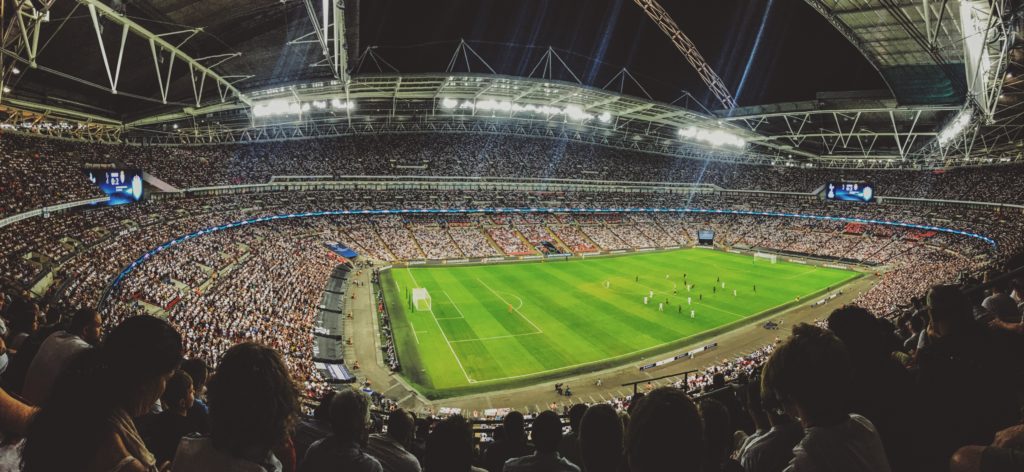What is the pie telling you?” asks Roger Bennett on Monday afternoons in the small, well-decorated Soho studio of “The Men in Blazers.”
At the end of every episode Bennett, a native Liverpudlian turned American soccer pundit, and his co-host Michael Davies take a bite out of a traditional English pie in search of guidance for their weekend predictions. Their show is part of NBC’s culturally fueled coverage of the English Premier League, which also features a predominantly British punditry team, informative historical documentaries, and other companion shows like “It’s Called Football.”
Since committing to make the Premier League, the richest and arguably most competitive soccer league in the world, a priority in 2013, NBC has worked hard to create an authentic viewing experience for its American audience. The network is focusing more on the history and culture of English football than the previous broadcasters of the Premier League, Fox, and ESPN.
The results seem to be largely positive. Soccer in America appears to be genuinely taking the next major step in its development. A Gallup poll released in January found that the percentage of Americans who enjoy watching soccer more than any other sport has increased from 4 percent in 2013 — the same year that NBC began broadcasting the Premier League — to 7 percent. And according to a 2017 study by sports economists at the University of Tubingen, five out of the top ten most popular soccer teams among Americans are British.
This increase in popularity has been particularly impressive compared with the flagging popularity of American football, basketball, and baseball. Recognizing this success, NBC doubled down on its commitment in 2015 by renewing the U.S. broadcasting rights to the Premier League for a reported $1 billion.
Soccer is at last developing a larger core fanbase in America, and the success of NBC’s coverage in helping the sport grow reveals the centrality of the English tradition to American soccer culture. But a new climate of cultural diversity appears to be falling into place: having found solid footing in British roots, mainstream soccer culture is now beginning to blend with the Latino tradition as well.

American Soccer’s English Ties
From NBC’s perspective, the network is more committed to authenticity than to explicitly leveraging English culture to grow the game. “I don’t think there’s an English master plan,” Bennett said in an interview with the HPR. “I think if anything, [NBC’s] goal has been intelligence, accessibility, and authenticity. We’re not trying to play up our Englishness. It is what we are.”
Instead, the “Men in Blazers” are attempting to blend the intense passion of English football with American patriotism. Bennett, who grew up amidst the socioeconomic turmoil of 1980s Liverpool latched onto football when he was young. “No matter what was going on in the country, no matter what was going on in the city — there were riots, there were political demonstrations, there was upheaval — those 90 minutes were utter, pure, bliss. And more than that they were symbols of our city pride, our urban pride, our independence, our identity,” he said.
But Bennett, who recently passed his U.S. citizenship test, also holds a reverence for America: “America always seemed to be a place where life was lived in glorious Technicolor. My life was always a double identity of being proudly proudly Liverpudlian and dreaming in my waking hours of America.”
It is this blend of culture that Bennett and Davis seek to embody in their show. “We partly bring over our own narrative having been forged, been cut from the stone of football,” said Bennett, “but we also bring a reverence and a respect and a love and adoration for everything that is American.”
The influence of British culture is not limited to the way the Premier League is covered. With American interest in the Premier League on the rise due to NBC’s broadcasts, British teams themselves are now allocating new resources toward a more concerted effort at earning American support. Patrick Collins, the Head of International Business Development at Swansea City — a position created this December — hopes to win over the growing number of American soccer fans who haven’t yet chosen a team. Having partnered with data analytics giant Nielsen, the club’s efforts are partly inspired by statistical analysis of the American market. “There are over 10 million people who are interested in the Premier League but don’t have a club yet,” said Collins in an interview with the HPR. “That’s a core target for us.”
Swansea is hoping to highlight its culture and history to win over American fans in this core target group. After seven successful Premier League seasons, Swansea was recently relegated to the second division of English soccer after finishing in the bottom three this season. The club’s time as the only Welsh team in the top flight was defined by an underdog mentality and a history of passionate support despite lacking the financial resources of the top English teams. When Swansea nearly went out of business in 2001, the fans stepped in to keep it afloat, and they remained involved as the Swans unexpectedly earned promotion through the lower divisions of British football to the glory of the Premier League.
This story was introduced to America when NBC aired the documentary “Jack to a King” in 2014, and the club hopes that this cultural history will help attract new fans. “If we could get a [supporters] chapter in every state, that would be absolutely amazing,” said Collins. “It’s a long way out, but we think that the “Jack to a King” story, that underdog mentality is something our fans can resonate with.” Perhaps that mentality will take on an even greater appeal if Swansea is able to make a quick return to the Premier League.
The Dark Side of English Influence
Authentic or not, some see an exclusionary danger to the rise of English football culture in the United States.
In a 2016 New York Times op-ed that made waves in the soccer world, Jay Caspian Kang wrote that “the spread of Europhilic American soccer culture excludes much of the population of American soccer fans, a healthy portion of whom are Latin American immigrants.” He described this European side of American soccer culture as “a dream of an ultimately monochromatic gathering in which thousands of white men can brawl…in the streets and drunkenly sing Phil Collins melodies in pubs, lending a hooligan snarl to a white, suburban culture.”
Many in the soccer world pushed back on Kang’s judgment. “This is just not representative of good journalism,” said Major League Soccer commissioner Don Garber. “It didn’t in any way remotely reflect the supporters culture in our league, or the demographics of our supporters.”
But Kang’s article did raise questions. In broadcast, Univision Deportes’ coverage of the Mexican soccer league, Liga MX, has generally drawn more viewers than NBC’s coverage of the Premier League. But as Kang pointed out, the Liga MX is rarely covered in mainstream sports media. And since the Univision broadcasts are in Spanish, no network is doing for the Liga MX what NBC is doing for the Premier League. No network is attempting to introduce new English speaking American soccer fans to Latino soccer culture in the way that NBC is exposing them to the British soccer world.
The disparity between European and Latino soccer cultures is also strong in American youth soccer where the high cost of play excludes poor black and Latino children, particularly immigrants from South and Central America.

The New American Soccer Culture
But a new and integrated soccer culture appears to be taking shape. Bennett was part of a 2013 study which found that U.S. Men’s national team players come from whiter, more educated, and wealthier communities than professional athletes in other American sports. Despite their roots in British football, the Men in Blazers are hoping to play a part in building this more integrated American soccer culture and resolving the historic inequalities in the sport. They are travelling to Los Angeles in May to do a special live show on the history of the Mexican national team. “We’re stepping up coverage of Mexico, Mexican football and the Mexican national team,” said Bennett. “Because of the passionate, developed, tactical, strategic, energizing footballing culture there, it’s something we want to do a lot, lot, more of.”
Collins also respects the importance of other soccer traditions in the United States and does not see Swansea as competing with the Latino culture. “Certainly there’s no reason that someone in Boston, for example, can’t support an MLS team and a Premier League team. Or for somebody in Texas to have an affiliation to a Mexican club but also a German club,” he said.
The MLS, too, is focused on creating an inclusive and culturally integrated soccer tradition. New expansion franchise Los Angeles Football Club in particular has sought to authentically blend the diverse cultures of American soccer into a new and cohesive identity. Despite having no actual players or stadium until this season, LAFC has been working with fans over the past three years to craft a club culture that authentically reflects the city and people of Los Angeles.
Rich Orosco, LAFC Executive Vice President of Brand and Community, feels that the club’s strong support is grounded in these efforts. “Everything we’ve done, everything that’s worked, has been 100 percent fueled by city pride,” he said in an interview with the HPR. “We want to always be humble and keep the city first. It’s about the city first, and a team should be just a reflection of that.”
To authentically reflect Los Angeles, which has an approximately 50 percent Latino population, then requires an integration of two soccer cultures that are still in the process of mixing. “We will most likely have a one-of-a-kind supporter culture,” said Orosco a few weeks before the club’s new soccer specific stadium opened this spring. “It’s going to be a beautiful mash-up of Latino and Barra Brava drums and passion along with the European pub spirit and entertaining songs.”
Like Collins, Orosco does not see any reason why fans should restrict themselves to a single league. “LAFC is about more soccer and more football. We’re not trying to convert [LAFC fans] from Liga MX or to convert them from the Premier League. We are offering more football because we believe in the power of the sport.”
Orosco feels that this inclusive new culture will play a major part in the continued growth of American soccer. “I think soccer culture is going to be a very unique differentiator for the sport that doesn’t exist in the other traditional American sports,” he said. “It’s very visual and very participatory. When you walk into a soccer match you’re going to feel like you’re a part of it.”
Image source: Unsplash/Mitch Rosen//Unsplash/Abigail Keenan.
